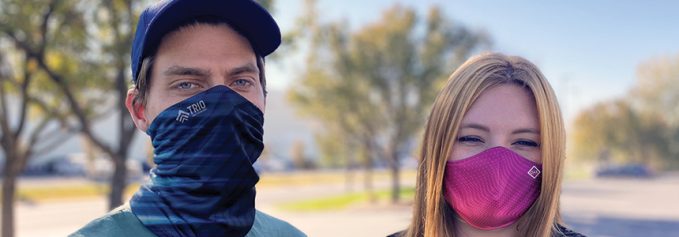
By Melissa Donovan
The popularity of digitally printed textile applications is apparent. Anyone and anything benefits from a digitally printed piece of fabric. Soft signage is a common application whether casually draped over display stands, hung from the ceiling, or attached to a silicone edge graphic frame.
Fabric optimized for digital print is used for signage, in addition to home décor, furnishings, and apparel, where there are many end use applications to be found.
While manufacturers, small businesses, and hobbyists make up the majority of the latter, print service providers (PSPs) step up their game and leverage signage expertise to enter into new markets—especially when faced with no other option.
For example, Signs.com was presented with one of its more challenging textile campaigns, according to Nelson James, president/co-founder, Signs.com, at the onset of the COVID-19 pandemic in 2020. After the recommendation from the Centers for Disease Control (CDC) that wearing face coverings would help slow the spread of the virus, the PSP started to develop and offer custom face masks.
Above: Mid-March 2020, Signs.com started designing and created its first line of cloth face masks, which customers personalize with their own art or use a predesigned template.
A Good Base
The company was in a position to produce face coverings because of its in-house fabric production processes already in place. Founded in 2012, Signs.com is based in Salt Lake City, UT. It started out small and in 2019 acquired Ferrari Color. Today the online company supplies custom signs and prints to small business owners, consumers, and Fortune 500 companies throughout Canada and the U.S.
Out of a 55,000 square foot facility, 150 employees primarily work on wide format orders—over 90 percent. Of that, 20 percent is digitally printed textiles. Applications include feather, teardrop, and angled flags; step-and-repeat banners; retractable banners; tension fabric displays; spirit flags; pop-up tents and displays; and table covers.
Businesses from many verticals request digitally printed fabric. “For our fabric banners, we see all types of businesses benefitting—from retailers utilizing them for point of purchase or in-store displays, restaurants and fast food operations using them for promotional purposes, to event organizers purchasing them for displays and backdrops for trade shows and conferences,” comments James.
To achieve digitally printed textile-based applications, the PSP uses a 3.2-meter dye-sublimation Impres 4320 Soft Signage System from MS Printing Solutions. It was chosen for its production speed—3,113 square feet per hour, in addition to its ability to accommodate a 2,500 square foot media roll.
Fabric is sourced exclusively from Fisher Textiles. “We have a long relationship with them thanks to their great customer service, the troubleshooting help they offer, plus transparency with any issues and how those might affect us. In addition, we have found that they plan far enough in advance so that they don’t have supply chain issues,” explains James.
Each textile is selected based on the product it will be ultimately used for. Factors that play into this include the fabric’s hand, stretchability, and opacity, as well as how it will be finished. James admits price maintains a role, but the characteristics are more critical in the decision making process.
When required, Signs.com chooses to use transfer paper from Beaver Paper, specifically 95 gram TexPrint XP. The thin, quick-drying paper offers dimensional stability, even when wet.
James shares the reasoning behind the choice. “Although a thinner paper gives more yield per roll, there are tradeoffs—it becomes more difficult to transfer and produces more cockling due to the sponge effect of the paper. On the other hand, going to a thicker basis weight paper gives amazing transfer qualities, but the roll lengths suffer and costs increase.”
The finishing of its textile applications is completed in house as well, using a Zund America, Inc. digital cutter as well as traditional sewing methods with JUKI industrial sewing machines.
When the question of whether to manufacture face masks and gaiters in house arose in response to the COVID-19 pandemic, “transitioning to cloth masks seemed like a natural extension of all of these capabilities—and a way to quickly address critical consumer need,” explains James.
Extending Further
In March of 2020, Signs.com started designing and created its first line of cloth face masks, which customers personalize with their own art or use a predesigned template. In April, it introduced Custom Face Masks in adult and youth sizes, with no minimum order, and a five day production turnaround. Custom neck gaiters were launched in May 2020.
Both the face masks and gaiters are printed on the Impres 4320. A tightly knit polyester from Fisher Textiles is used on the internal part of the face mask with an antimicrobial layer outside for increased protection. Gaiters are constructed out of stretch polyester—also from Fisher Textiles—with an antimicrobial option.
“Wide format digital printing in conjunction with our free online design tool allows us to produce all these products with one-off, custom graphics for every customer—and to do so quickly and efficiently,” notes James.
The efficacy of the process did not come about overnight, however, there was a learning curve. As ordering volumes increased, production capabilities had to ramp up simultaneously—and this was with less staff on hand due to COVID-19. The company allowed many of its non-production employees to work from home. Employees remaining in plant as well as in office followed social distancing and safety protocols per CDC guidelines.
“We created and grew a product from zero masks on day one to almost 2,400 in one day at peak ordering capacity. We did the same with gaiters, growing from zero to a peak of about 1,500,” explains James.
To combat the rising number of orders and handle the bottleneck apparent in the sewing department, Signs.com reached out and outsourced sewing vendors and at-home sewing contractors. “Simply managing the daily check in/check out of the home sewing technicians was a chore in and of itself, of course the complexity of having upwards of 2,000 unique, one-off orders each day was challenging as well,” comments James.
At press time, the PSP produced nearly 175,000 standard face masks and gaiters. The continued customer interest is welcome as other job orders are infrequent. “Due to the COVID-19 pandemic, we’ve seen a major decrease in requests for trade show and other event-related signage—this includes printed textiles as well and just about everything else. Although a few cities have opened for events in a limited capacity, the U.S. trade show industry has essentially been paused,” shares James.
Quick Adaption
With a background in signage-based applications, Signs.com leveraged its knowledge in digitally printed fabric at a time when both its employees and customers needed assistance. Keeping the business running, the print provider offers both custom cloth face masks and neck gaiters to address a critical consumer demand.
According to James, as with every business, the company made adjustments—sometimes on the fly—because of COVID-19. “But we think we managed to adapt as quickly as possible.”
Jan2021, Digital Output


